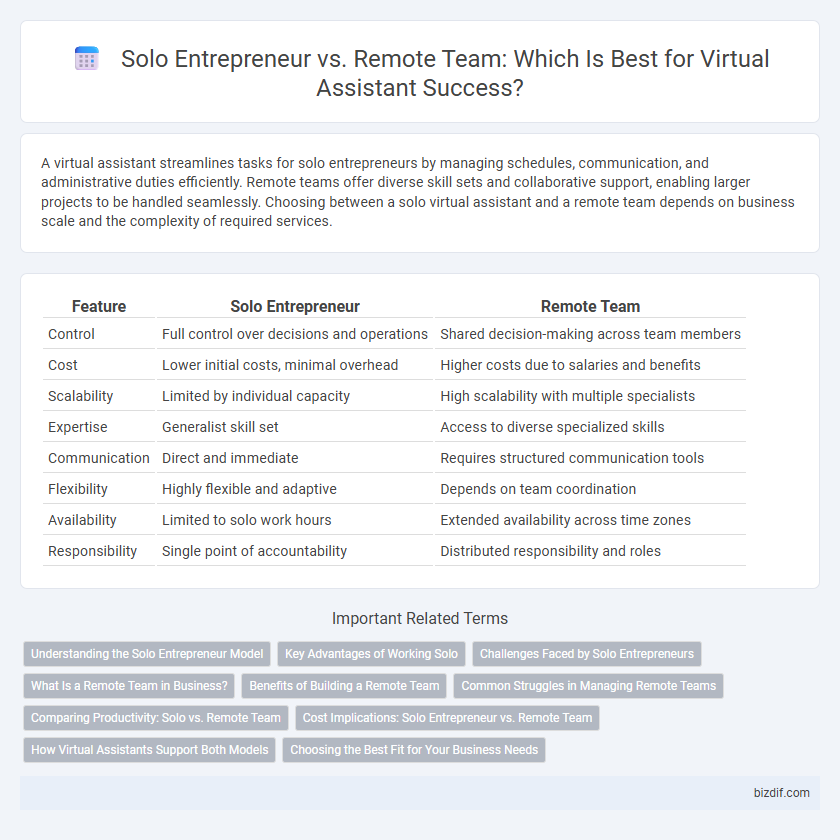A virtual assistant streamlines tasks for solo entrepreneurs by managing schedules, communication, and administrative duties efficiently. Remote teams offer diverse skill sets and collaborative support, enabling larger projects to be handled seamlessly. Choosing between a solo virtual assistant and a remote team depends on business scale and the complexity of required services.
Table of Comparison
| Feature | Solo Entrepreneur | Remote Team |
|---|---|---|
| Control | Full control over decisions and operations | Shared decision-making across team members |
| Cost | Lower initial costs, minimal overhead | Higher costs due to salaries and benefits |
| Scalability | Limited by individual capacity | High scalability with multiple specialists |
| Expertise | Generalist skill set | Access to diverse specialized skills |
| Communication | Direct and immediate | Requires structured communication tools |
| Flexibility | Highly flexible and adaptive | Depends on team coordination |
| Availability | Limited to solo work hours | Extended availability across time zones |
| Responsibility | Single point of accountability | Distributed responsibility and roles |
Understanding the Solo Entrepreneur Model
The Solo Entrepreneur model emphasizes independent control, allowing one individual to manage all aspects of their virtual assistant business without relying on a remote team. This approach streamlines decision-making and reduces overhead costs, making it ideal for entrepreneurs seeking flexibility and full autonomy. Leveraging specialized skills and digital tools enhances efficiency, enabling solo entrepreneurs to deliver personalized service while maintaining scalability.
Key Advantages of Working Solo
Working solo as a virtual assistant offers unmatched flexibility in managing schedules and prioritizing tasks, enabling quick decision-making without reliance on team consensus. Solo entrepreneurs benefit from direct client communication, fostering personalized service and stronger client relationships. This autonomy streamlines workflow, reduces overhead costs, and allows for tailored skill development aligned with individual career goals.
Challenges Faced by Solo Entrepreneurs
Solo entrepreneurs often grapple with time management challenges, juggling multiple roles without the support structure found in remote teams. Limited access to diverse skill sets slows project completion and innovation, impacting overall productivity. The absence of collaborative brainstorming can lead to isolation and decision fatigue, hindering strategic growth.
What Is a Remote Team in Business?
A remote team in business consists of professionals working from various geographic locations, collaborating through digital tools to achieve common goals. This structure enhances flexibility, allowing businesses to access diverse talent pools without the constraints of physical offices. Remote teams often increase productivity and reduce operational costs compared to solo entrepreneurs who manage all tasks independently.
Benefits of Building a Remote Team
Building a remote team allows solo entrepreneurs to scale their operations efficiently while accessing a global talent pool with diverse skills and expertise. Remote teams provide flexibility and increased productivity by enabling asynchronous work and reducing overhead costs associated with physical offices. Leveraging a remote workforce enhances collaboration through digital tools, leading to faster project completion and higher customer satisfaction.
Common Struggles in Managing Remote Teams
Solo entrepreneurs managing remote teams often face challenges such as communication breakdowns, lack of real-time collaboration, and difficulties in monitoring productivity across different time zones. Ensuring consistent workflow and maintaining team motivation become critical issues in a virtual environment. Leveraging effective project management tools and establishing clear accountability can mitigate these common struggles.
Comparing Productivity: Solo vs. Remote Team
Solo entrepreneurs often experience streamlined decision-making and faster task completion due to minimal communication barriers, leading to higher productivity in focused efforts. Remote teams leverage diverse skill sets and collaboration tools, enhancing problem-solving capabilities but sometimes facing delays caused by coordination challenges. Productivity varies based on project complexity, with solo entrepreneurs excelling in agility and remote teams thriving in multitasking and innovation.
Cost Implications: Solo Entrepreneur vs. Remote Team
Hiring a solo entrepreneur as a virtual assistant typically involves lower fixed costs, including a single salary and minimal overhead expenses, making it ideal for startups and small businesses with tight budgets. In contrast, a remote team requires higher investment due to multiple salaries, technology infrastructure, and coordination efforts, but offers greater scalability and diverse expertise. Careful analysis of workload, budget constraints, and long-term goals is essential to determine the most cost-effective virtual assistance model.
How Virtual Assistants Support Both Models
Virtual assistants enhance solo entrepreneurs by managing administrative tasks, scheduling, and client communications, allowing them to focus on core business activities. For remote teams, virtual assistants streamline collaboration through calendar coordination, data management, and automated workflows that improve productivity. Both models benefit from virtual assistants' ability to offer scalable support, reduce operational costs, and ensure efficient time management.
Choosing the Best Fit for Your Business Needs
Solo entrepreneurs offer personalized attention and flexible scheduling, ideal for small businesses seeking cost-effective solutions with direct communication. Remote teams provide diverse expertise and scalability, fitting businesses with complex projects or growth aspirations requiring collaboration across multiple disciplines. Assessing project complexity, budget constraints, and desired level of control ensures selecting a virtual assistant model that aligns with specific operational goals.
Solo entrepreneur vs Remote team Infographic

 bizdif.com
bizdif.com